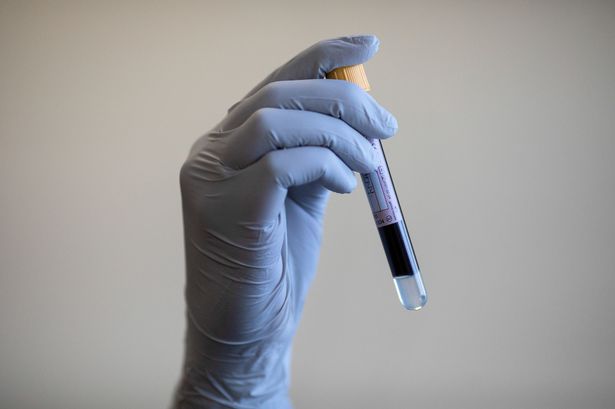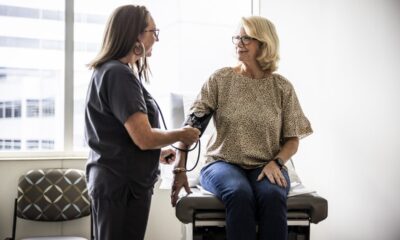Science
Revolutionary Blood Test Showcases Potential in Cancer Detection

A new blood test, named Galleri, is making waves in cancer care as it demonstrates the ability to detect over 50 types of cancer. Currently being trialled in the NHS, the test shows a 62% accuracy rate in identifying individuals who may have cancer, according to findings from the Pathfinder 2 study. This innovative approach could significantly transform early cancer detection and treatment.
The Galleri test works by detecting DNA fragments in the bloodstream that are shed by cancer cells. This method allows for the identification of cancer signals even before symptoms appear, potentially leading to earlier interventions. Researchers emphasize the importance of early detection, as it enables less invasive treatment options and increases the chances of successful outcomes.
Results from a comprehensive US trial indicate that the test is highly effective in ruling out cancer for those not affected by the disease. In fact, it successfully excluded cancer in 99.6% of participants who tested negative. This remarkable accuracy not only saves time but also reduces unnecessary costs associated with follow-up testing.
According to the findings presented at the European Society for Medical Oncology (ESMO) Congress in Berlin, 61.6% of individuals who tested positive for a cancer signal were eventually diagnosed with cancer. Furthermore, the test accurately identified the originating organ or tissue in 92% of cases. Notably, more than half of new cancers detected were in the earliest stages (I or II), allowing for prompt and potentially less aggressive treatments.
Sir Harpal Kumar, president of International Business and BioPharma at Grail and former head of Cancer Research UK, expressed optimism about the findings. He remarked, “We’re really very excited and we think this is a further step along the way in really transforming cancer outcomes.” His statements highlight the potential for the Galleri test to complement existing cancer screening programs, such as those for breast and bowel cancer.
The study’s results suggest that integrating the Galleri test with routine screenings could lead to a more than seven-fold increase in the number of cancers detected within a year. Specifically, the test identified cancer signals in 216 participants, with 133 subsequently diagnosed with cancer. An upcoming NHS trial will further assess the effectiveness of the test in screening asymptomatic individuals, with results expected in mid-2024.
Modelling indicates that the Galleri test could be implemented as an annual blood test for individuals aged 50 and above, a demographic where cancer incidence sharply rises. Sir Harpal Kumar noted that this approach could be more cost-effective for this age group, while also benefiting younger individuals with a history of cancer or genetic predisposition.
Research published in BMJ Open in May highlighted the profound implications of annual blood tests for cancer detection. It estimated that such tests could lead to a 49% reduction in late-stage diagnoses and a 21% decrease in cancer-related deaths within five years compared to standard care.
The Galleri test represents a significant advancement in the fight against cancer, offering hope for earlier detection and improved treatment options. As trials continue, the medical community remains optimistic about the potential to enhance cancer outcomes and save lives.
-

 Entertainment3 months ago
Entertainment3 months agoAnn Ming Reflects on ITV’s ‘I Fought the Law’ Drama
-

 Entertainment4 months ago
Entertainment4 months agoKate Garraway Sells £2 Million Home Amid Financial Struggles
-

 Health3 months ago
Health3 months agoKatie Price Faces New Health Concerns After Cancer Symptoms Resurface
-

 Entertainment3 months ago
Entertainment3 months agoCoronation Street’s Carl Webster Faces Trouble with New Affairs
-

 Entertainment3 months ago
Entertainment3 months agoWhere is Tinder Swindler Simon Leviev? Latest Updates Revealed
-

 Entertainment4 months ago
Entertainment4 months agoMarkiplier Addresses AI Controversy During Livestream Response
-

 Science1 month ago
Science1 month agoBrian Cox Addresses Claims of Alien Probe in 3I/ATLAS Discovery
-

 World2 weeks ago
World2 weeks agoBailey Announces Heartbreaking Split from Rebecca After Reunion
-

 Health4 months ago
Health4 months agoCarol Vorderman Reflects on Health Scare and Family Support
-

 Entertainment4 months ago
Entertainment4 months agoKim Cattrall Posts Cryptic Message After HBO’s Sequel Cancellation
-

 Entertainment3 months ago
Entertainment3 months agoOlivia Attwood Opens Up About Fallout with Former Best Friend
-

 Entertainment2 weeks ago
Entertainment2 weeks agoCoronation Street Fans React as Todd Faces Heartbreaking Choice




















